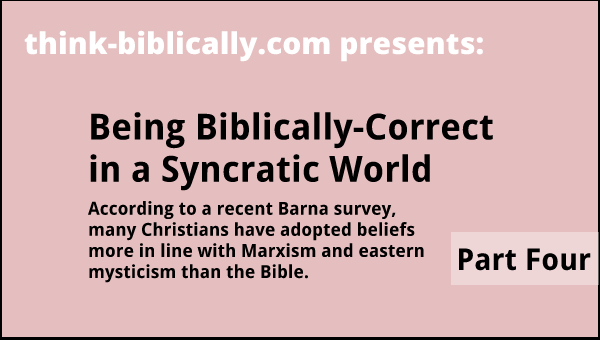By Tyson Thorne

This is the final entry in a series we started last Thursday. A survey conducted by Barna and Summit Ministries revealed many worldly philosophies have gained a foothold in the minds of many practicing Christians. This is alarming on many levels, and we have taken the time to examine Scripture in such a way that it overcomes these false belief systems. Yesterday we looked at post-modern ethics and determined that its fundamental flaw is the absence of God from its reasoning. Today we uncover three Marxist beliefs that many Christians believe to be true.
11% of those surveyed strongly agree that private property encourages greed and envy. Greed and envy are products of man’s sinful nature, not property rights or even wealth. Possibly the oldest book in the Bible, Job, tells us that Job and his children had property, livestock and wealth. After the exodus on the Mountain of God Moses received the Ten Commandments, the eighth of which is against “stealing”. One cannot steal unless what they are taking belongs to another. Once God guided Israel to the promised land, he divided up the land into 12 states – one for each tribe of Israel – and the only state that was not permitted to have private property was that of the priesthood. Other examples abound in the Old Testament, but let us turn to the New. In Acts 5 we see that Peter recognizes the property held by Ananias and Sapphira was theirs, to do with as they please. In Luke 10.7, Jesus teaches that a worker deserves his pay. There are other occasions, too numerous to mention, whereby property is assumed to be owned (such as Judas buying a field upon which he killed himself, and more). Owning property is neither a sin nor does it lead to it, man’s heart does all that on its own.
14% of those surveyed strongly agree that the government, and not individuals, should control as much of the resources as necessary to ensure that everyone gets their fair share. There is nothing in the Bible that indicates wealth should be shared equally, in fact Jesus taught the opposite in Mathew 20:
When [the workers] received [their pay], they began to complain against the landowner, saying, ‘These last fellows worked one hour, and you have made them equal to us who bore the hardship and burning heat of the day.’ And the landowner replied to one of them, ‘Friend, I am not treating you unfairly. Didn’t you agree with me to work for the standard wage? Take what is yours and go. I want to give to this last man the same as I gave to you. Am I not permitted to do what I want with what belongs to me? Or are you envious because I am generous?’
If everything is shared equally, then there is no longer room for generosity. Besides this, government is no less sinful than individuals. Ecclesiastes says “If you see the extortion of the poor, or the perversion of justice and fairness in the government, do not be astonished by the matter.” Government is not a living being, it is an organization of sinful humanity and is therefore just as easily corrupted as an individual.
15% of those surveyed strongly disagree with the statement that if the government leaves them alone, business will mostly do what is right. This is another pro-government\anti-private property belief, largely answered by the above two questions. However, it should also be pointed out that like government, businesses are not living being eithers; they too are run by sinful people and are easily influenced to sinful activity. Many Old and New Testament followers of Elohim owned their own businesses, and in Acts we see the example of Pricilla, a woman who owned her own business and helped support Paul’s ministry. Neither government nor business has been sanctified by heaven and both will be either a force for good or evil based on the people who run them.
|
|
